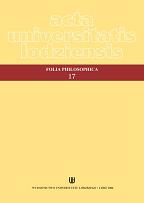Theodor W. Adorno: pojęcie pięknej natury
Theodor W. Adorno's Notion of the Beautiful Nature
Author(s): Beata FrydryczakSubject(s): Philosophy
Published by: Wydawnictwo Uniwersytetu Łódzkiego
Keywords: Adorno; beautiful nature
Summary/Abstract: Theodor W. Adorno aesthetics is considered as the last and the most important theory, which is formulated from a perspective of the aesthetics of art. It established an understanding of the contemporary art and its mechanisms. In spite of its wide reception, the interpretations of Adorno's conception often overlook his notion of beautiful nature. The notion is the main subject of my article. I want to show that it is not only vividly present in "Ästhetische Theorie", but also takes an important part in Adorno's aesthetic theory and in his understanding of art and of aesthetic experience. Such an attitude allows me to interpret Adorno's theory from a perspective of the "extended aesthetics", which consider the aesthetics of nature as an important part of the field. Since Hegel, who rejected the concept of nature from the field of aesthetic, Adorno is the first aesthetician who re-entries the model of aesthetics understood as domain of both nature and art. Adorno admitted the notion of beautiful nature an important place in his aesthetics. For him, the acknowledgement of the beauty of nature is a condition of art and aesthetics experience. At the same time, the natural beauty is a medium of some utopian values. The involuntary perception characteristic of beautiful nature and a kind of memento "imprinted" in it are some archaic rudiments that do not correspond with the rationality of cultural industry.
Journal: Acta Universitatis Lodziensis. Folia Philosophica. Ethica - Aesthetica - Practica
- Issue Year: 2005
- Issue No: 17
- Page Range: 139-151
- Page Count: 13
- Language: Polish

